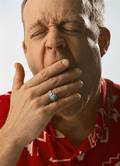Sleep Therapy Restores Brain Function in Insomniacs
Brain imaging suggests it could be a non-pharmacological intervention for the disorder.
|
E-mail this article
Subscribe to news
Printer friendly version
|

(SOURCE: American Academy of Sleep Medicine, news release, Sept. 1, 2008)
THURSDAY, Sept. 4 (HealthDay News) -- Insomnia compromises brain functions that affect verbal fluency but may not hurt one's speaking ability, a new study says.
Functional magnetic resonance imaging (fMRI) scanning found that the left medial prefrontal cortex and the left interior frontal gyrus -- two brain regions that deal with fluency -- are less active during verbal fluency tasks being performed by insomniacs, compared with other people.
However, the study results, published in the Sept. 1 issue of the journal Sleep, showed that those with insomnia generated more words than non-insomniacs on both the category fluency task (46.4 words compared with 38.7 words) and the letter fluency task (40.1 words compared with 32.7 words).
"It was surprising to see that the patients performed at a higher level than the control group, but showed reduced brain activation in their fMRI results," principal investigator Ysbrand Der Werf, of the Netherlands Institute for Neuroscience in Amsterdam, said in a news release issued by the magazine's publisher. "The success during the task may reflect a conscious effort to counteract the effect of poor sleep."
The researchers found that six weeks of sleep therapy restored the brain function and also helped patients generate more words on the verbal fluency tasks, although they said the additional number of words was not statistical significant.
Sleep therapy treatment combined restriction of sleep with multifaceted cognitive-behavior therapy, exposure to bright light in the morning and late afternoon, and body temperature manipulations.
According to the study authors, these results should encourage the use of sleep therapy in clinical practice as a low-cost, non-pharmacological treatment for insomnia.
The study included 21 chronic insomnia patients and 12 healthy controls with an average age of around 60. People with insomnia for at least 2.5 years were considered "chronic."
More information
The American Academy of Sleep Medicine has more about insomnia. 
Copyright © 2008 ScoutNews, LLC. All rights reserved. 
HealthDayNews articles are derived from various sources and do not reflect federal policy. healthfinder.gov does not endorse opinions, products, or services that may appear in news stories. For more information on health topics in the news, visit the healthfinder.gov health library.